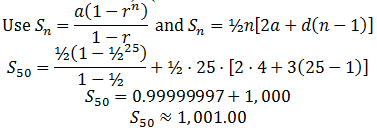Problem 1. If the sum of the first n terms of an arithmetic sequence is given by Sn=2n2+5n, Find the nth term of the arithmetic sequence
Solution: We shall use the formula
Where S0=0
=2n2+5n-[2(n2-2n+1)+5n-5]
=2n2+5n-2n2+4n-2-5n+5
an=4n+3
Thus, nth term of the arithmetic sequence is 4n+3.
P2. The sum of first n terms of an arithmetic sequence is (5n–n2) The nth term of the arithmetic sequence is
(a) (5-2n) (b) (6-2n) (c) (2n-5) (d) (2n-6)
Sol:
Let Sn denotes the sum of first n terms of the arithmetic sequence.
S(n-1)=5(n-1)-⋅(n-1)2=5n-5-n2+2n-1
=7n–n2-6
∴ nth term of the arithmetic sequence, an=Sn–S(n-1)
=6-2n
Thus, the nth term of the arithmetic sequence is (6-2n).
Answer: (b) (6-2n)
P3. The sum of the first it terms of an arithmetic sequence is (4n2+2n). The nth term of this arithmetic sequence is
(a) (6n-2) (b) (7n-3) (c) (8n-2) (d) (8n+2)
Solution:
Let Sn denotes the sum of first n terms of the arithmetic sequence.
⇒S(n-1)=4⋅(n-1)2+2(n-1)
=4(n2-2n+1)+2(n-1)
=4n2-6n+2
∴ nth term of the arithmetic sequence, an=Sn–S(n-1)
=8n-2
Thus, the nth term of thee arithmetic sequence is (8n-2)
Answer: (c) (8n-2)
P4. If the sum of n terms of an arithmetic sequence is 2n+3n2. Find the nth term.
Solution:
We have Sn=2n+3n2
=2(n-1)+3(n2-2n+1)
=2n-2+3n2-6n+3
S(n-1)=3n2-4n+1
nth term =an=Sn–S(n-1)
=2n+3n2-3n2+4n-1
an=6n-1
P5. The sum of the first n terms of an arithmetic sequence is (3n2+6n). Find the nth term and the 15th term of this arithmetic sequence.
Solution:
Let Sn denotes the sum of first n terms of the arithmetic sequence.
S(n-1)=3(n-1)2+6(n-1)
=3(n2-2n+1)+6(n-1)
=3n2-3
∴ nth term of the arithmetic sequence, an.
=(3n2+6n)-(3n2-3)
=6n+3
Putting n=15, we get a15=6⋅15+3=90+3=93
Hence, the nth term is (6n+3) and 15th term is 93.
P6. The sum of the first n terms of an arithmetic sequence is given by Sn=(3n2–n). Find its
(i) nth term, (ii) first term and (iii) common difference.
Solution:
Given Sn=(3n2–n) … (a)
Replacing n by (n-1) in (a), we get:
=3(n2-2n+1)-n+1
=3n2-7n+4
(i) Now, an=Sn–S(n-1)
=(3n2–n)-(3n2-7n+4)=6n-4
∴ nth term, an=(6n-4) … (b)
(ii) Putting n=1 in (b), we get:
(iii) Putting n=2 in (b), we get:
∴ Common difference, d=a2–a1=8-2=6
P7. If the sum of first in terms of an arithmetic sequence is (2m2+3m) then what is its second term? Solution:
Let Sm denotes the sum of first In terms of the arithmetic sequence.
=2⋅(m-1)2+3(m-1)=2(m2-2m+1)+3(m-1)=2m2–m-1
Now,
mth term of arithmetic sequence, am=Sm–S(m-1)
am=4m+1
Putting m=2, we get
a2=4⋅2+1=9
Hence, the second term of the arithmetic sequence is 9.
P8. The sum of n terms is given by Sn=½n(1+n). Determine a5.
Solution:
S4=½⋅4⋅(1+4)=10
a5=15-10=5
P9. (Prizes) A radio station is offering a total of $8500 in prizes over ten hours. Each hour, the prize will increase by $100. Find the amounts of the first and last prize.
Solution:
Given n=10, d=100 and S10=8500.
Find the value of a1.
S10=½⋅10⋅[2a1+(10-1)100]
8500=5⋅[2a1+900]
a1=400
Find the value of a10.
=400+(10-1)100
=1300
Answer: $400 and $1300
P10. In an AP: given a3=15, S10=125, find d and a10.
Solution:
Here, a3=15 and S10=125.
a+(3-1)d=15
a+2d=15
a=15-2d … (1)
The sum of n terms of an arithmetic sequence is given by
S10=½⋅10⋅[2a+(10-1)d]
125=5[2a+9d]
2a+9d=25
Putting the value of a from equation (1), we get
30-4d+9d=25
5d=-5
d=-1
Putting the value of d in equation (1), we get
an=a+(n-1)d
a10=17+(10-1)(-1)= 17-9 =8
a10=8
P11. In an AP: given d=5, S9=75, find a and a9.
Solution:
Here, d=5 and S9=75. The sum of n terms of an arithmetic sequence is given by
S9=½⋅9⋅[2a+(9-1)(5)]
75=½⋅9⋅[2a+40]
75=9a+180
75-180=9a
a=-105/9=-35/3=-11⅔
⇒an=a+(n-1)d
a9=-11⅔+(9-1)5
a9=-11-⅔+40
a9=40-11-⅔
a9=28⅓
P12. If the sum of a certain number of terms of the arithmetic sequence 25, 22, 19, is 116. Find the last term
Solution:
Let the sum of n terms of the given arithmetic sequence be 116.
Here, a=25 and d=22-25=-3
232=n⋅[50-3n+3]
232=53n-3n2
3n2-53n-232=0
3n2-24n-29n+232=0
3n(n-8)-29(n-8)=0
(n-8)(3n-29)=0
n=8 or n=29/3
However, n cannot be equal to 29/3. Therefore, n=8. ∴ The last term
a8=25-3⋅7=4
Thus, the last term of the arithmetic sequence is 4.
P13. The sum of the first eight terms of an arithmetic sequence {an} is 24; the sixth term is 0. Find a formula for an.
Solution:
For an, first find a and d. Since: a6=a+5d,a+5d=0. Express S8 in terms of a and d,
Since we are given S8=24, Equation (3) states that 4(2a+7d)=24. This gives a pair of equations to solve for a and d.

We find d=-2 and a=10. Therefore, the nth term is
P14. In an arithmetic sequence, the first term is 2 and the sum of the first five terms is one-fourth of the next five terms. Show that 20th term is -112.
Solution:
First term =2
Let d be the common difference of the arithmetic sequence
Therefore, the arithmetic sequence is 2, 2+d, 2+2d, 2+3d,
Sum of first five terms =10+10d
Sum of next five terms =10+35d
According to the given condition,
40+40d=10+35d
30=-5d
d=-6
a20=a+(20-1)d=2+(19)(-6)=2-114=-112
Thus, the 20th term of the arithmetic sequence is -112.
P15. The sum of the first 14 terms of and arithmetic sequence is 1505 and its first term is 10. Find its 25th term.
Solution:
Let d be the common difference of the arithmetic sequence.
Here, a=10 and n=14.
Given S14=1505.
½⋅14⋅[2⋅10+(14-1)⋅d]=1505
7(20+13d)=1505
20+13d=215
13d=215-20=195
d=15
∴ 25th term of the arithmetic sequence,
=10+360
=370.
Hence, the required term is 370.



